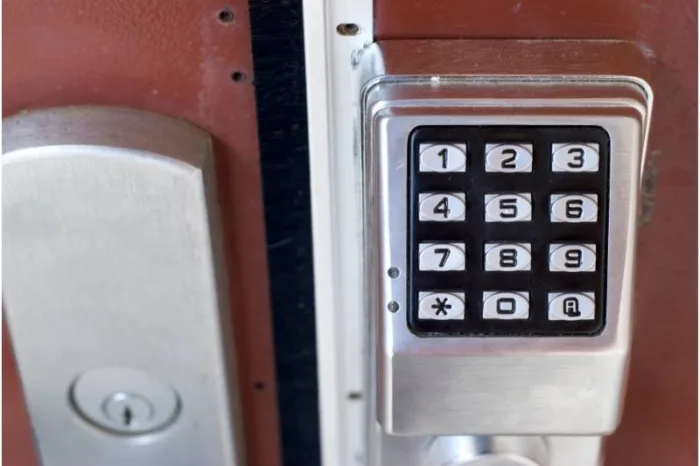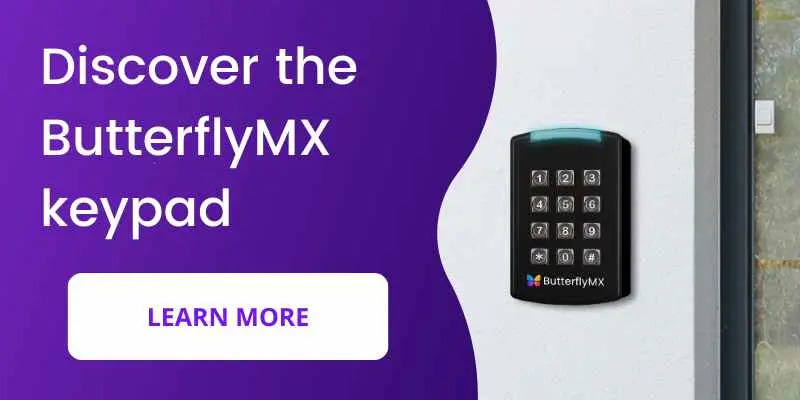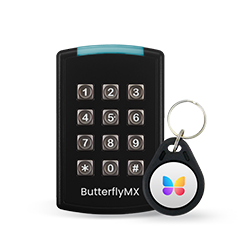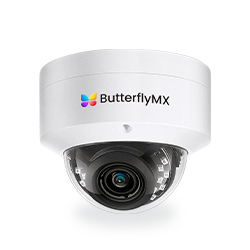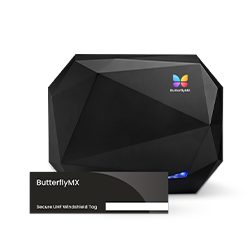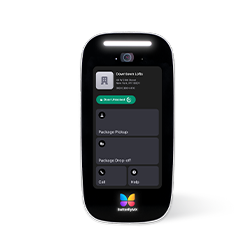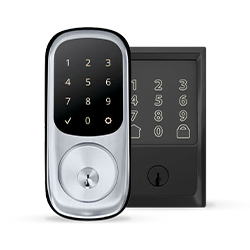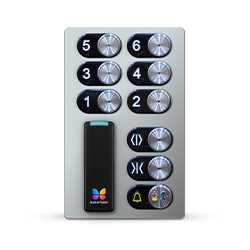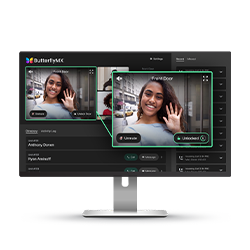Key takeaways
- Commercial keypad door locks are ideal for commercial properties such as office buildings, gyms, hospitals, and even storage facilities. These locks offer robust security while enhancing ease of access for tenants, employees, or clients.
- These locks are commercially graded for strength, durability, quality materials, and functionality.
- The best benefits of keypad door locks are that they’re electronic, keyless, and may enable smartphone-based entry.
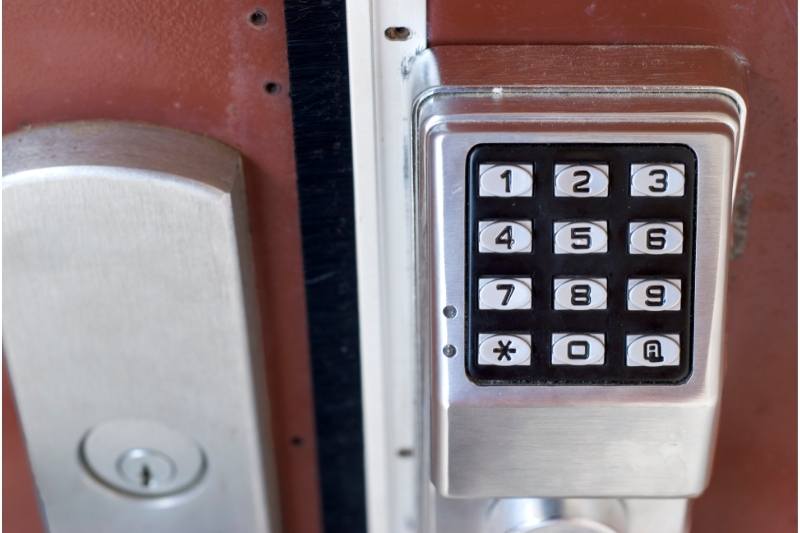
When controlling access within your building, choose a solution that’s easy to use without compromising security. One popular option is installing commercial door locks.
With that said, every building has unique needs when it comes to access control. This guide covers what commercial keypad door locks are and how they work. We also cover what types are currently available. Then, we recommend the best alternative to commercial keypad door locks.
This post covers:
- The top 5 commercial keypad door locks to buy
- What is a commercial keypad door lock?
- How do commercial keypad door locks work?
- 3 benefits of commercial keypad door locks
- Should you get commercial keypad door locks?
The top 5 commercial keypad door locks to buy
- The ButterflyMX Keypad
- Schlage CO-100 Commercial Keypad Lock
- Kwikset 660 Single Cylinder Electronic Keypad Lock
- Yale Assure Lock SL
- Honeywell 6100 Series Commercial Keypad Lock
1. The ButterflyMX Keypad
The ButterflyMX Keypad is the best alternative to a commercial keypad door lock. ButterflyMX is a technology company specializing in access control solutions for multifamily and commercial properties. ButterflyMX is installed in over 15,000 buildings and has over 40,000 five-star reviews.
Key features:
- Keep your existing locks. By choosing ButterflyMX, you can keep your existing door strike and connect the keypad.
- Smartphone compatibility. Tenants can open doors by swiping their phones via the ButterflyMX mobile app.
- Multiple entry options. In addition to a keypad or smartphone, your ButterflyMX Keypad can use key cards and fobs as entry credentials.
- Easy guest access. Tenants can remotely allow access to their guests by sending them temporary PIN codes.
- Cloud-based technology. The ButterflyMX Keypad keeps track of everyone who enters the building and stores this information on the cloud.
- Easy to update and install. The ButterflyMX Keypad is quick and easy to install at virtually any access point. Plus, software updates are automatically installed over the internet, reducing the need for maintenance and enabling new features long after installation.
More than 40K, 5-star reviews!
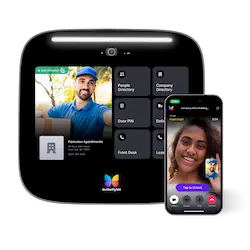
Video Intercoms
Open doors, gates & garages from anywhere.
Access Control
Fob, key cards, PINs, and mobile apps.
Security Cameras
Visibility throughout your property.
Vehicle Access
Hands-free access for gates & garages.
Package Room
Receive, store, and manage deliveries.
Smart Locks
Connect to all major brands and models.
Elevator Controls
Unlock key-fobbed elevators for anyone.
Front Desk Station
See all your doors and cameras in one place.
2. Schlage CO-100 Commercial Keypad Lock
Schlage, a leading brand in the security industry, has been providing high-quality locks for over 100 years. Known for their innovation and reliability, Schlage offers a wide range of locking solutions for both residential and commercial properties. Their CO-100 keypad lock series delivers durable and secure access control solutions for businesses looking for electronic, keyless entry systems.
Key features:
- Keypad access with up to 1000 programmable user codes
- Advanced security with built-in alarm functionality
- Battery-powered with low-battery warning
- Weather-resistant design ideal for outdoor use
- Simple installation on standard doors
- Audit trail logs of who entered and when (via optional software)
- ANSI Grade 1 certification for maximum security
3. Kwikset 660 Single Cylinder Electronic Keypad Lock
Kwikset, a well-established name in home and commercial security, is known for its innovative locking solutions. With a commitment to enhancing safety and convenience, Kwikset offers a variety of keyless entry systems that cater to both residential and commercial needs. The 660 series is designed for businesses that require simple yet effective electronic access control with minimal maintenance.
Key features:
- Up to six user codes for access control
- SmartKey re-keying technology allows quick key changes
- Battery-powered with long-lasting power
- Built-in lockout mode after three incorrect code attempts
- Easy installation on most doors
- ANSI/BHMA Grade 2 security rating
4. Yale Assure Lock SL
Yale, a trusted name in lock manufacturing for over 175 years, is renowned for creating secure, reliable, and cutting-edge locking systems. As part of the Assa Abloy group, Yale combines smart technology with traditional security, offering a wide range of residential and commercial products. The Assure Lock SL is a sleek, high-tech option for businesses seeking keyless entry with modern convenience.
Key features:
- Keyless entry with a sleek touchscreen keypad
- Smartphone compatibility via Yale Access app (integrates with smart home systems like Apple HomeKit and Z-Wave)
- One-touch locking for easy operation
- Up to 250 unique user codes for access management
- Voice-guided programming for easy setup
- Weather-resistant for both indoor and outdoor use
- Low-battery warning and emergency key override
5. Honeywell 6100 Series Commercial Keypad Lock
Honeywell is a global leader in technology and manufacturing, known for delivering high-quality products across a range of industries. With over a century of expertise, Honeywell’s security solutions are trusted by businesses and governments alike. Their 6100 Series commercial keypad lock is built to provide robust, reliable access control with advanced features designed for high-security environments.
Key features:
- Up to 50 user codes with individual access times
- Auto-locking feature for enhanced security
- Weatherproof and rugged for durability in all environments
- Multiple locking modes, including passage, private, and timed access
- Battery-powered with an easy-to-replace battery system
- Simple programming and access management
- ANSI Grade 1 certification for commercial-grade security
What is a commercial keypad door lock?
A commercial keypad door lock is a type of keyless lock that lets you control which tenants and staff can enter a building or room. These locks have a numerical keypad (or touchscreen interface with numbers) in place of traditional keyholes.
In commercial properties, keypad door locks are installed at:
- Individual office suites
- Custodial closets
- Supply rooms
- Office amenity spaces
- Restrooms
You can assign authorized users PIN codes that they use to gain access to specific areas within a commercial property. Commercial door locks with keypads empower you to lock certain rooms while ensuring convenient access for authorized tenants and visitors. Commercial keypad door locks with panic bars are common for emergency exits or entries.
Additionally, some commercial digital door lock keypads can only be programmed to accept one PIN code credential, while others allow each tenant to set their codes.
Components of commercial keypad door locks include:
- Keypad. The keypad replaces the traditional key-and-lock system. Instead, tenants enter a PIN code to gain access.
- Unlocking mechanism. When someone enters an authorized PIN code, the unlocking mechanism physically moves or releases the lock. This enables the user to open the door or gate.
- Control panel. Known as the system’s brain, the control panel stores all its data. This includes tenant information and authorized PIN codes. The panel either lives on-site or on a cloud-based server.
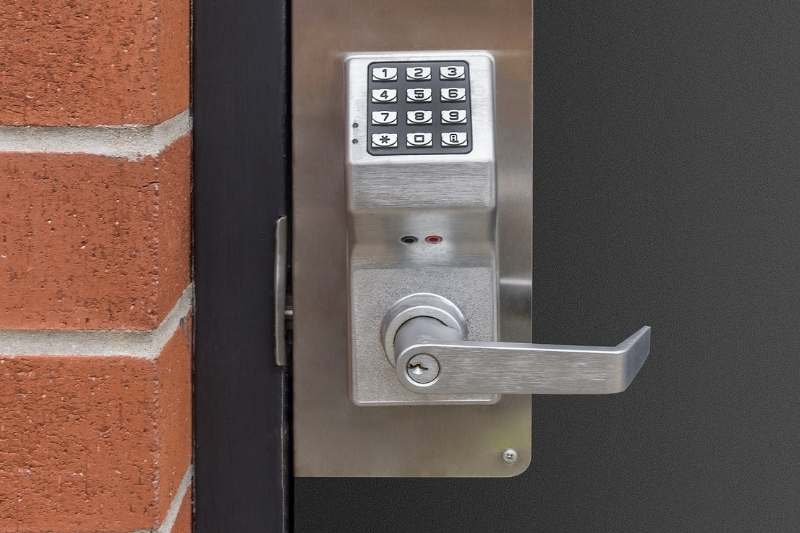
Do keypad locks have batteries?
It depends. Some keypad door locks often operate independently of power sources in your building, so they’re battery-powered. Since commercial keypad door locks use very little energy, their batteries typically last long.
On the other hand, other keypad locks are connected directly to a power source, such as a magnetic or electronic door lock. These locks are the most common with property-wide access control solutions and don’t require batteries.
How do commercial keypad door locks work?
Using a keypad to access rooms is simple and convenient for commercial tenants. Commercial keypad door locks allow tenants to gain access without the easily and frequently lost credential: the brass key.
Here’s how a tenant uses a keypad lock for commercial doors:
- Enter a PIN code on the touchscreen or with mechanical buttons on the keypad.
- The keypad then unlocks the door. When the keypad receives the correct PIN, it unlocks the door by sending an electric current to the lock.
- After the lock is disengaged, the tenant can enter.
For emergencies, a key can be inserted into the lock, which opens the door traditionally. Lastly, commercial exterior keypad door locks with IP65 ratings can withstand rain and dust. This means they can be installed anywhere outside a property, like at a gate or parking lot entrance.
Watch how ButterflyMX works:
Commercial keypad door lock installation
Commercial keypad door locks are relatively easy to install. Installation involves replacing your doorknob and possibly the lock. Factoring in the lock’s price, the installation will cost between $600 and $1,200 per door.
Are locks with keypads safe?
Keypad locks are just as safe as key locks.
Regarding the functionality of a keypad lock, tenants are less likely to be locked out due to a lost or forgotten key. Also, they’re less likely to have their keys stolen by criminals. This is because physical keys tend to be hidden in not-so-secret spots, like under the doormat. All tenants need is their smartphones or PIN codes to enter, which are much less likely to be stolen.
Can keypad door locks be hacked?
If not properly set up, keypad door locks can be hacked. Commercial-grade keypad door locks are stronger, made from better materials, and are more secure than regular, commonly hacked ones. However, this doesn’t mean they’re immune to hacking.
A few precautions you can take to prevent your keypad from being hacked include:
- Make sure your WiFi network is secure. If using a smart commercial keypad, they can be hacked through the internet. As such, equip your building with a robust, firewalled WiFi network.
- Keep the area well-lit. Someone is less likely to physically tamper with your lock if they think they can be easily identified by others.
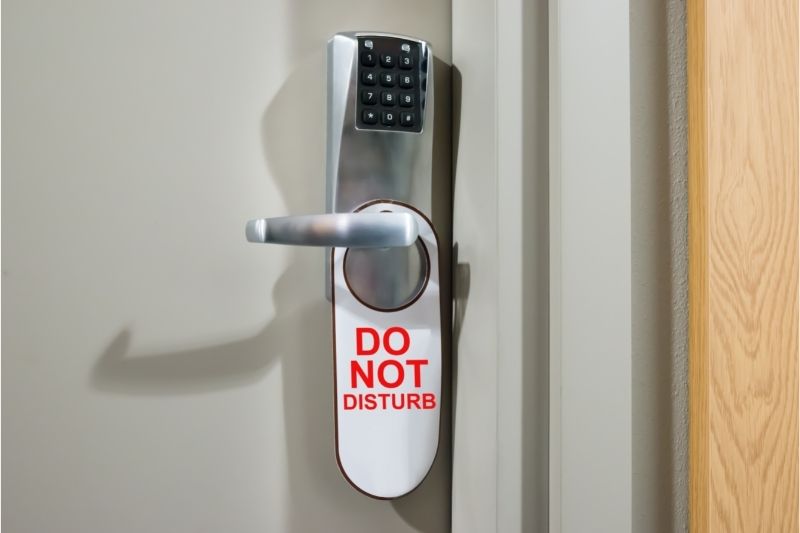
3 benefits of commercial keypad door locks
There are many commercial locks to choose from, but keypad locks are a solid option. Read on to learn why.
Here are three benefits of keypad door locks for commercial properties:
They’re electronic
Commercial electronic door lock systems are a big step from traditional mechanical locks, like mortise and cylindrical locks. They’re generally easier and more convenient to use.
Also, electronic locks have built-in fail-safe or fail-secure technology so that they work even during a power outage.
In more depth, here are the differences between fail-safe and fail-secure electronic locks:
- Fail-safe: These locks require continuous power to stay activated. In the event of an emergency or building-wide power outage, they deactivate. This allows tenants to quickly pass through without using their credentials.
- Fail-secure: These locks don’t require continuous electricity to stay activated. Instead, they respond to a single burst of electricity from a tenant’s credentials (such as a key fob). These locks stay engaged if the power goes out. As such, this adds more security to the building in the event of an outage.
They enable keyless entry
Commercial keyless door locks are convenient because they eliminate the need for physical keys. Keypad locks even eliminate the need for physical credentials!
Since keypad door locks are a keyless entry solution, tenants can unlock the door without keys, commercial fobs, or cards. All they need is a PIN code, so they need nothing to worry about carrying in their pockets.
This enhances the tenant experience and saves time for property managers and staff. They won’t have to spend time cutting keys and programming fobs.
Some enable smartphone-based entry
If you want to make door access throughout your building truly smart, you’ll want locks that can be controlled with a smartphone. And the good news: Some keypad door locks enable that!
Commercial smart locks pair with a mobile app to allow users to lock and unlock doors from their smartphones. This adds another convenience layer by empowering tenants to control door access from anywhere — even off-site.
Important: Keep in mind that not all commercial keypad door locks offer smartphone-based entry. Some models only accept PIN code entries.
Should you get commercial keypad door locks?
Overall, commercial keypad door locks are a good solution for anyone who wants to upgrade the locks throughout their building. Keypad door locks are more convenient than traditional mechanical locks requiring a key to enter.
If you want to purchase keypad locks, look for smart locks that pair with a mobile app. Smart keypad locks offer the two most convenient entry methods: PIN code and smartphone-based entry.
Keypad door locks are suitable for private offices and custodial closets. With that said, you should consider another access control solution for shared spaces and rooms. For instance, the ButterflyMX keypad is your best alternative for those needs.
The benefits of the ButterflyMX keypad include:
- Keep your existing locks. By choosing ButterflyMX, you can keep your existing door strike and connect the keypad.
- Smartphone compatibility. Tenants can open doors by just swiping their phones. This saves time typing in a code or searching for their keys or keycards. The numeric keypad can be used as an alternative if they don’t have their phones on them.
- Easy guest access. Tenants can remotely allow access to their guests by sending them temporary PIN codes.
- Cloud-based technology. The ButterflyMX keypad keeps track of everyone who enters the building and stores this information on the cloud.
- Camera-equipped. The keypad takes a photo of everyone who uses it. In addition to deterring crime, this can help identify culprits.
- Easy to update and install. The keypad is quick and easy to install at virtually any access point. Plus, software updates are automatically installed over the internet, reducing the need for maintenance.
What are the disadvantages of keypad locks?
While we believe the advantages of keypad door locks outweigh the disadvantages, there are a few factors you should consider.
Disadvantages of keypad locks include:
- Wear and tear. Keypads can degrade over time, causing numbers to fade or malfunction with heavy use.
- Battery dependency. Frequent battery replacement may be required, and locks can fail if batteries die.
- Security risks. PIN codes can be guessed, shared, or compromised, especially with weak or simple codes.
- Vulnerable to hacking. Smart keypad locks connected to WiFi are susceptible to cyberattacks if not properly secured.
- No backup option. Many keypad locks lack a traditional keyhole, leaving users locked out in case of malfunction.
- User error. Mistyped PIN codes can cause lockouts, especially for people unfamiliar with the technology.
- Higher upfront costs. Keypad locks generally cost more than traditional locks and may have ongoing maintenance expenses.
We recommend a system like our ButterflyMX Keypad that is resistant to all of the above disadvantages for traditional keypad locks.

Learn more about ButterflyMX
Fill in the form below, and we'll email you right back.
Have questions?
Fill in the form below, and we'll email you right back.
